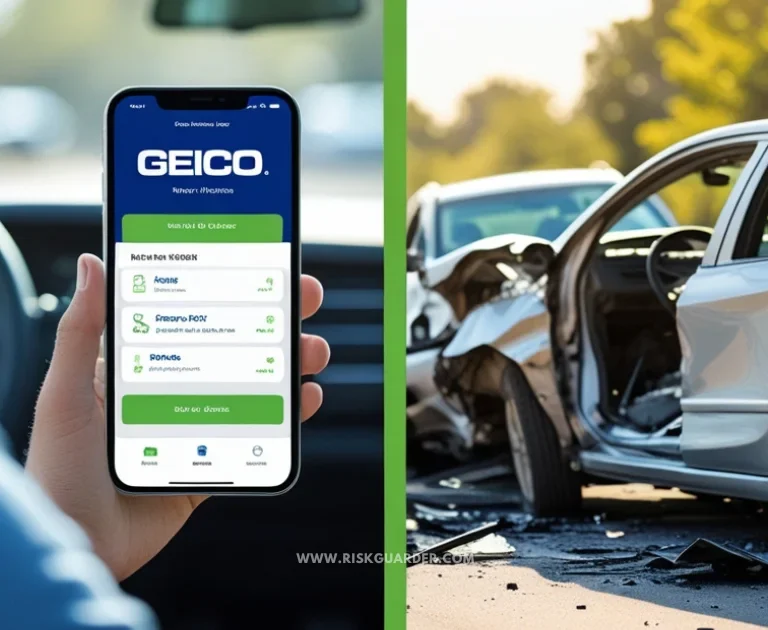You’ve seen the commercials with Jake from State Farm. You’ve probably read a review or two on Google. But you’re still asking the critical question: Is State Farm really a good insurance company? More importantly, is it the right choice for your specific situation and needs?
To give you the definitive answer, we went deeper than surface-level ratings. We analyzed the comprehensive findings from all the top financial experts and industry watchdogs. We dove into thousands of real customer reviews across multiple platforms. And most critically, we investigated the factor that almost no other reviewer emphasizes enough: the pivotal role of your specific State Farm agent in determining your entire experience with the company.
This State Farm insurance review represents hundreds of hours of research, data synthesis, and pattern analysis. Our goal is simple: to help you make an informed decision about one of the largest and most established insurance providers in America. Our analysis is based on the official RiskGuarder Review Methodology, which prioritizes financial strength, customer satisfaction data, complaint indices, and real-world user experiences.
📊 The Intelligence Briefing: What You Need to Know
The Expert Consensus: Major financial review sites like NerdWallet, Bankrate, and US News consistently give State Farm high marks. The company earns praise for its exceptional financial strength, above-average J.D. Power customer satisfaction scores, and better-than-average NAIC complaint ratios for a company of its massive size.
The Public Sentiment: Aggregated consumer review platforms like Trustpilot and ConsumerAffairs tell a more complicated story, with significantly lower average ratings. Common complaints center on claims processing delays, difficulty reaching corporate departments, and inconsistent service quality across different locations.
The Core Insight (Our Unique Angle): This striking disconnect between expert ratings and consumer reviews is almost entirely explained by State Farm’s agent-centric business model. Your experience with State Farm insurance is not primarily determined by the corporate entity—it’s determined by the quality, expertise, and dedication of your specific local agent and their office staff.
The Verdict: State Farm is an excellent choice for consumers who value a personal relationship with a dedicated local insurance professional and are willing to invest time in finding a highly-rated agent in their area. It is a poor fit for those who prefer a purely digital, self-service experience with minimal human interaction or those who prioritize rock-bottom pricing above all other factors.
Table of Contents
The Expert Analysis: What the Big Review Sites Conclude
Before we dive into our unique insights, let’s establish the foundation. We analyzed the most recent comprehensive reviews from the most trusted names in personal finance journalism. Here’s what the established authorities conclude about State Farm insurance:
| Metric | NerdWallet | Bankrate | US News | Our Summary |
|---|---|---|---|---|
| Overall Rating | 4.5 / 5 | 4.2 / 5 | 4.1 / 5 | High marks from all major reviewers, consistently ranking in top tier. |
| J.D. Power Score | Above Average | Above Average | Above Average | Consistently strong customer satisfaction in official industry studies. |
| NAIC Complaint Index | Better than Average | Better than Average | Better than Average | Fewer official complaints than competitors of similar size. |
| Financial Strength (A.M. Best) | A++ (Superior) | A++ (Superior) | A++ (Superior) | Financially rock-solid with superior ability to meet policyholder obligations. |
| Coverage Options | Comprehensive | Comprehensive | Comprehensive | Wide range of standard and specialized coverage options available. |
| Digital Experience | Good | Good | Average | Functional app and website, though not as streamlined as digital-first competitors. |
Sources: Data compiled from 2024-2025 reviews published on NerdWallet.com, Bankrate.com, and USNews.com.
What This Expert Consensus Tells Us: From a purely objective, data-driven perspective, State Farm is an exceptionally strong insurance company. The A++ rating from A.M. Best—the highest possible financial strength rating—means there is virtually no risk of the company being unable to pay legitimate claims. This is the foundation of any insurance evaluation, and State Farm passes with flying colors.
The NAIC complaint index, which measures the ratio of complaints received relative to a company’s market share, shows State Farm performing better than the industry average. This is particularly impressive given that State Farm is the largest auto insurer in the United States, with approximately 16% market share. Larger companies typically receive more complaints simply due to their size, yet State Farm maintains a favorable ratio.
The J.D. Power studies, which survey thousands of actual policyholders about their satisfaction with various aspects of their insurance experience, consistently rank State Farm above the industry average. These studies measure factors like policy offerings, price, billing and payment, interaction with the company, and claims handling.
The Bottom Line from Experts: If you were making a decision based solely on financial stability metrics, industry complaint ratios, and official customer satisfaction surveys, State Farm would be an easy recommendation. But there’s more to the story.
The Great Disconnect: Why Are Online Reviews So Different?

Here’s where things get really interesting. While the experts are giving State Farm thumbs up, regular folks on review sites are… not so enthusiastic.
On Trustpilot? State Farm’s sitting at around 1.8 out of 5 stars. ConsumerAffairs? About 2.5 out of 5. And if you check out Google Reviews for individual State Farm offices, it’s all over the map—some have nearly 5 stars, others are barely scraping by with 2.
So what gives? We read through literally hundreds of reviews to figure this out, and we found some pretty clear patterns.
The Good Reviews: Almost every positive review mentions their agent by name. Like, “Sarah at the downtown office was amazing!” These happy customers talk about agents who actually pick up the phone, walk them through claims, and genuinely seem to care about helping them out.
The Bad Reviews: The negative ones? They usually fall into a few buckets:
- People who tried to do everything through State Farm’s 1-800 number or app without talking to their agent—and ended up frustrated with long hold times and getting bounced around
- Folks with complicated claims who felt abandoned when their agent just handed them off to corporate
- Customers stuck with agents who never return calls or have staff constantly quitting
The Answer: The Agent Model
State Farm uses what’s called a “captive agent model.” Basically, their agents only sell State Farm stuff and run their own local offices. This is totally different from companies like GEICO or Progressive, where you’re mostly dealing with call centers and apps.
In the State Farm model, your agent is not just a salesperson who disappears after you buy a policy. They are intended to be your primary point of contact for virtually everything: policy changes, coverage questions, billing issues, and claims guidance. The quality of your State Farm experience is therefore almost entirely dependent on the quality of your specific agent and their office staff.
This explains the disconnect. The expert reviewers are evaluating State Farm as a corporate entity—its financial strength, its corporate policies, its official complaint ratios. But individual consumers are evaluating their personal experience with one specific agent and office, which can vary dramatically from location to location.
The State Farm Agent: Your Biggest Asset (and Biggest Variable)
This is the most important section of our review, and it’s the insight that most other reviews completely miss. Understanding the role of the State Farm agent is absolutely critical to making an informed decision about whether State Farm is right for you.

The Role of the Agent: More Than Just a Salesperson
A State Farm agent is not simply someone who sells you a policy and then hands you off to corporate. In the ideal State Farm experience, your agent serves multiple critical functions:
Policy Consultant: Your agent should review your coverage annually, identify gaps in your protection, and recommend appropriate coverage limits and endorsements based on changes in your life situation. They should explain complex concepts like liability limits, deductibles, and policy exclusions in language you can understand.
Claims Advocate: When you have a claim, your agent should be your first call. While the actual claims adjuster works for State Farm corporate, a good agent will guide you through the process, help you understand what documentation is needed, set appropriate expectations, and intervene if there are issues or delays.
Service Manager: Your agent handles policy changes, answers coverage questions, processes payments, and resolves billing issues. They should make these routine transactions simple and efficient.
Personal Contact: Perhaps most importantly, your agent is a real person in your community who you can meet face-to-face, who knows your name, and who has a vested interest in keeping you as a satisfied long-term customer.
The Pros of Having a Good State Farm Agent
When the agent model works as intended, it provides significant advantages over purely digital insurance companies:
Personalized Advice: A knowledgeable agent can identify coverage needs you might not have considered. For example, they might recommend umbrella liability coverage if you have significant assets to protect, or they might suggest specific endorsements for your homeowners policy based on local risks in your area.
Claims Guidance: Navigating an insurance claim can be stressful and confusing. A good agent demystifies the process, helps you understand what to expect, and serves as your advocate if issues arise. They can also advise you on whether filing a small claim is worth the potential rate increase.
Simplified Service: Instead of navigating phone trees or chatbots, you have a direct number to call and a real person who knows your situation. Need to add a teenage driver? Change your address? Adjust your coverage? Your agent handles it quickly.
Relationship Continuity: Over time, your agent learns about your life changes—new homes, new cars, children getting driver’s licenses—and can proactively adjust your coverage to match your evolving needs.
Local Expertise: Your agent understands the specific insurance requirements and common risks in your state and community, from flood zones to state-specific coverage mandates.
The Cons of a Bad Agent (or the Wrong Fit)
The flip side of the agent model is that a poor-quality agent can make your State Farm experience genuinely frustrating:
Poor Communication: Some agents are difficult to reach, slow to respond to emails or calls, or fail to return messages promptly. This defeats the entire purpose of having a personal agent.
High Staff Turnover: If an agent’s office has constant staff turnover, you’ll find yourself repeatedly explaining your situation to new people who don’t know your history.
Limited Expertise: Not all agents have the same level of knowledge or experience. Some may not fully understand complex coverage scenarios or may provide incorrect information.
Pressure Sales Tactics: Some agents are overly aggressive about selling additional products or coverage you may not need, prioritizing their commission over your best interests.
Unavailability During Claims: The most common complaint we found in negative reviews is agents who are helpful during the sales process but become difficult to reach or unhelpful when you actually need to file a claim.
How to Vet a State Farm Agent: Our Essential Checklist
Since your agent is basically everything, here’s how to make sure you’re picking a good one:
✅ Stalk Their Google Reviews: Don’t just look at State Farm’s overall rating. Search for “[Agent’s Name] State Farm [Your City]” and read reviews for THAT specific office. Look for patterns—do people rave about their service, or complain they can’t get anyone on the phone?
✅ Ask How Long They’ve Been Around: How many years have they been a State Farm agent? Agents with 10+ years usually know their stuff better than newbies. Also ask about their staff—if everyone’s been there a while, that’s a good sign.
✅ Ask About Claims: Straight up ask them: “When I file a claim, what do YOU do? Do you help me, or just give me a phone number?” Their answer will tell you everything.
✅ See How They Communicate: Pay attention during your first conversations. Do they call you back quickly? Answer your questions clearly? Actually listen to what you need? Or do they seem rushed and just want to make a sale?
✅ Ask What Makes Them Different: Try asking, “What makes your office better than other State Farm agents?” Good agents will talk about their service, their team, how they help with claims. Mediocre ones will just talk about price.
✅ Ask for References: Don’t be shy—ask if you can talk to a few of their long-term customers. Good agents won’t have a problem with this.
✅ Visit Their Office: If you can, stop by in person. Is it organized? Is the staff friendly? The vibe usually matches the service you’ll get.
Real Talk: Picking State Farm isn’t just about picking the company—it’s about picking the RIGHT agent. Spend time on this. It’ll make or break your whole experience.
State Farm Auto Insurance Reviews: Coverage and Performance

State Farm’s the biggest auto insurer in America (they cover about 1 in 6 cars), so let’s talk about what they offer.
Coverage Options: State Farm offers all standard auto insurance coverages including liability, collision, comprehensive, uninsured/underinsured motorist protection, and medical payments coverage. They also provide several valuable optional coverages and endorsements:
- Rideshare Coverage: Essential for Uber and Lyft drivers, this fills the gap between personal auto insurance and commercial coverage.
- Rental Reimbursement: Covers the cost of a rental car while your vehicle is being repaired after a covered claim.
- Roadside Assistance: Provides towing, jump-starts, flat tire changes, and lockout service.
- Original Equipment Manufacturer (OEM) Parts Endorsement: Ensures your vehicle is repaired with manufacturer parts rather than aftermarket alternatives.
Key Discounts: State Farm offers numerous discount opportunities that can significantly reduce your premiums:
- Drive Safe & Save: This usage-based insurance program uses telematics to monitor your driving habits and can provide discounts up to 30% for safe driving behaviors.
- Steer Clear: Young drivers under 25 can earn discounts by completing a safe driving program.
- Multiple Policy Discount: Bundling auto and home insurance typically saves 15-20% on both policies.
- Good Student Discount: Full-time students maintaining a B average or better qualify for reduced rates.
- Vehicle Safety Features: Cars equipped with anti-theft devices, airbags, and anti-lock brakes earn discounts.
How Are Claims? J.D. Power says State Farm’s above average for claims satisfaction. Simple stuff (like a cracked windshield) gets handled fast. Complex claims with liability disputes can take longer.
Is It Good? For drivers with clean records, yeah, State Farm’s competitive and solid. The agent can be super helpful when you need to file a claim. But if you’ve got accidents or tickets on your record, you might find cheaper options elsewhere.
State Farm Homeowners Insurance Reviews: Protecting Your Property
State Farm is also one of the largest homeowners insurance providers in the United States, offering coverage in all 50 states. Their homeowners policies follow a similar model to their auto insurance: comprehensive coverage options delivered through local agents.
Coverage Options: State Farm offers multiple tiers of homeowners insurance:
- HO-3 (Special Form): The most common policy type, providing “all-risk” coverage for your dwelling and “named-peril” coverage for personal property.
- HO-5 (Comprehensive Form): Premium coverage offering “all-risk” protection for both dwelling and personal property, with higher coverage limits.
- HO-6 (Condo Insurance): Specialized coverage for condominium owners.
- HO-4 (Renters Insurance): Coverage for tenants’ personal property and liability.
Important Endorsements: State Farm offers valuable optional coverages that address common gaps in standard homeowners policies:
- Water Backup Coverage: Protects against damage from sewer or drain backups, which standard policies typically exclude.
- Equipment Breakdown Coverage: Covers mechanical failure of home systems like HVAC, electrical, and plumbing.
- Identity Restoration Coverage: Provides assistance and reimbursement if you’re a victim of identity theft.
- Replacement Cost Coverage: Ensures personal property is replaced at current market value rather than depreciated actual cash value.
Available Discounts: State Farm homeowners can access multiple discount opportunities:
- Bundling Discount: Combining home and auto insurance typically saves 15-20% on both policies.
- Home Security Discount: Monitored alarm systems, smoke detectors, and fire sprinklers reduce premiums.
- Claims-Free Discount: Maintaining a history without claims earns reduced rates.
- New Home Discount: Recently built homes often qualify for lower premiums due to modern construction standards and updated systems.
State Farm Homeowners Insurance Customer Service Rating: J.D. Power’s Home Insurance Satisfaction Study ranks State Farm slightly above the industry average. Customers generally report satisfaction with routine policy service, though some complex claims—particularly those involving significant property damage or liability disputes—receive mixed reviews regarding settlement timelines and amounts.
State Farm vs Progressive: A Direct Comparison
People ask us this all the time. Here’s the deal:
Business Model: State Farm operates through captive agents with local offices, while Progressive primarily functions as a direct-to-consumer company with centralized call centers and a digital-first approach.
Pricing: Progressive often offers lower initial quotes, particularly for drivers with less-than-perfect records. State Farm typically provides more competitive rates for drivers with clean records and those who bundle multiple policies.
Customer Experience: State Farm emphasizes the personal agent relationship, while Progressive focuses on digital convenience and self-service tools. Your preference here depends entirely on how you prefer to interact with your insurance company.
Financial Strength: Both companies hold A+ (Superior) ratings from A.M. Best, indicating exceptional financial stability and claims-paying ability.
Claims Satisfaction: J.D. Power studies show both companies performing above industry average, with State Farm scoring slightly higher in overall satisfaction but Progressive earning praise for claims processing speed.
The Bottom Line: Choose State Farm if you value a personal agent relationship and prefer human interaction for service and claims. Choose Progressive if you prioritize digital convenience, prefer self-service tools, and want to minimize human interaction.
State Farm J.D. Power Ranking and NAIC Complaint Index: The Data
Let’s get into the objective stuff:
J.D. Power Rankings: J.D. Power conducts annual studies surveying thousands of insurance customers about their satisfaction across multiple categories. In the most recent studies:
Claims Satisfaction Study: State Farm received above-average marks for both auto and home claims handling.
Auto Insurance Study: State Farm scored 838 out of 1,000, placing it above the industry average of 826.
Home Insurance Study: State Farm scored 827 out of 1,000, compared to the industry average of 815.
These scores indicate that State Farm policyholders report higher satisfaction than the average across the insurance industry.
NAIC Complaint Index: The National Association of Insurance Commissioners calculates a complaint index for each insurance company by comparing the number of complaints received to the company’s market share. A score of 1.0 represents the industry average—scores below 1.0 indicate fewer complaints than expected for a company of that size, while scores above 1.0 indicate more complaints than expected.
State Farm’s most recent NAIC complaint indices:
- Auto Insurance: Approximately 0.67 (33% fewer complaints than industry average)
- Homeowners Insurance: Approximately 0.58 (42% fewer complaints than industry average)
These favorable complaint ratios are particularly impressive given State Farm’s massive market share. Larger companies typically receive more complaints simply due to having more customers, yet State Farm maintains better-than-average ratios.
What This Data Means: The objective data consistently supports State Farm as a high-quality insurance provider with strong customer satisfaction and fewer complaints than competitors of similar size. This aligns with the expert consensus we discussed earlier and reinforces State Farm’s position as a top-tier insurance company from a corporate performance perspective.
Frequently Asked Questions About State Farm Insurance Review
Is State Farm good insurance?
Yeah, objectively it’s good—great financial ratings, happy customers in surveys, fewer complaints than average. BUT your experience totally depends on your agent. If you get a good one and you like having a personal relationship, it’s great. If you get a bad agent or hate dealing with people, it’ll suck.
How does State Farm compare to other major insurers?
State Farm’s right up there with the best—Nationwide, Allstate, etc. The agent thing makes it different from Progressive and GEICO though.
Are State Farm rates competitive?
For people with clean records who bundle policies, yeah. If you’ve got accidents or tickets, probably not the cheapest. The Drive Safe & Save thing can save you serious money if you’re a safe driver.
What are the most common complaints about State Farm?
Claims taking forever, can’t reach corporate, different offices give wildly different service, arguments over claim amounts. Almost all of this gets better with a good agent.
Is having a State Farm agent worth it?
If you like having a real person who knows you and helps with claims, absolutely. But only if you pick a GOOD agent. If you prefer apps and no human contact, probably not your thing.
What are the problems with State Farm agents?
Quality’s all over the place. Some are amazing, some are impossible to reach or don’t know their stuff. That’s why vetting your agent is so important.
How is State Farm’s claims process?
Above average according to J.D. Power. Easy stuff gets handled fast through the app or your agent. Complicated stuff takes longer and really depends on how involved your agent is.
Final Verdict: Is State Farm Right for You? A Decision Framework
After reading thousands of reviews and analyzing all the data, here’s our honest take:
Choose State Farm If:
You value personal relationships and human interaction. If you prefer having a specific person to call who knows your name and your situation, rather than navigating call centers or chatbots, State Farm’s agent model is designed for you.
You have a standard insurance profile. Drivers with clean records, homeowners with no recent claims, and customers seeking standard coverage options will find State Farm offers competitive pricing combined with strong service and financial stability.
You’re willing to do the homework to find an excellent agent. If you’re prepared to invest time researching agent reviews, meeting with multiple agents, and choosing carefully, you can access one of the best insurance experiences available in the market.
You plan to bundle multiple policies. State Farm’s multi-policy discounts are competitive, and having one agent handle all your insurance needs (auto, home, umbrella, life) can provide significant convenience and cost savings.
You want rock-solid financial stability. State Farm’s A++ rating from A.M. Best means you can have complete confidence in their ability to pay claims, even in catastrophic scenarios.
You appreciate local community connections. State Farm agents are typically embedded in their local communities, which can provide value beyond just insurance transactions.
Consider Alternatives If:
You’re All About Apps: If you want to do everything digitally and never talk to anyone, Progressive or GEICO is more your speed.
You’re primarily a rate shopper. If you switch insurance companies every year to chase the absolute lowest price and aren’t interested in building a long-term relationship, you’ll likely find cheaper options elsewhere, particularly if you have a less-than-perfect driving record.
You have a very complex or non-standard risk profile. If you have multiple DUIs, a history of significant claims, or very unusual coverage needs, you may be better served by a specialized broker who can access multiple insurance markets rather than being limited to State Farm’s products.
You’ve had negative experiences with agent-based models in the past. If you’ve previously been frustrated by agents who were difficult to reach or unhelpful, and you don’t want to risk repeating that experience, a direct-to-consumer model might provide more consistent (if less personalized) service.
Our Recommendation:
State Farm represents a traditional, relationship-based approach to insurance that works exceptionally well when you find the right agent. The company’s financial strength is unquestionable, their corporate performance metrics are strong, and their coverage options are comprehensive.
However, your satisfaction will almost entirely depend on your specific agent’s quality, responsiveness, and expertise. This makes choosing State Farm a two-step decision: first, decide if you want an agent-based model; second, invest significant effort in finding an excellent agent in your area.
If you’re willing to take both steps, State Farm can provide an outstanding insurance experience that combines financial security, comprehensive coverage, and personalized service. If you’re not willing to invest that effort or don’t value the agent relationship, you’ll likely be happier with a digital-first alternative.
The most important takeaway from this review: Don’t just choose State Farm—choose the right State Farm agent. That single decision will determine whether State Farm becomes one of your best financial decisions or a source of ongoing frustration.
This review was researched and written by Youssef at RiskGuarder. Our analysis is based on data from A.M. Best, the National Association of Insurance Commissioners (NAIC), J.D. Power studies, and comprehensive review of customer feedback across multiple platforms. We maintain editorial independence and are not compensated by State Farm or any insurance company for our reviews. Last updated: October 2025.







2 Comments